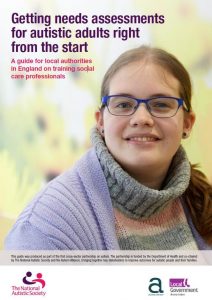As the Chief Social Worker for Adults I have a deep interest in making sure the Government’s Autism Strategy is a practical and effective reality.
We all know that getting the right support at the right time is crucial for autistic people. Along with the statutory guidance that underpins it, the Autism Act 2009 emphasises our obligations as social care professionals to provide the best support we can.
 Making sure adults living with autism receive a good and thorough assessment of their social care needs begins with understanding their strengths, hopes and what matters most to them. This approach is vital - how else can the right support be unlocked?
Making sure adults living with autism receive a good and thorough assessment of their social care needs begins with understanding their strengths, hopes and what matters most to them. This approach is vital - how else can the right support be unlocked?
A survey of councils in 2016 revealed that fewer councils than expected have autism training plans in place. Of particular concern for social workers is the indication that not enough of us are receiving the specialist education on autism we need to carry out high quality assessments.
To address this shortfall, a cross-sector partnership, supported by the Department of Health and Social Care, has created a new guide for councils.
Collaborators include the National Autistic Society, the Autism Alliance UK, the Local Government Association and the Association of Directors of Adult Social Services, alongside social workers and, most importantly, autistic people.
The guide is based on councils’ experiences of providing training and it supports staff in carrying out social care needs assessments. Many councils in England have done great work in making sure their staff understand autism. It’s important that we share this work with others across the care and support sector.
I know that money is tight in many councils, but when Kent rolled out a new model of staff training and support for autistic adults, they achieved large savings which can be put to good use supporting others.
And we all know that getting things right first time is not only the most cost-effective way, but also leads to the best outcomes for the people we support.
I strongly urge you to read this new guide. Visit the National Autistic Society for more information, including some invaluable resources for you and your colleagues to use and share within and between your organisations.
5 comments
Comment by Kathy Erangey posted on
Dear Lyn,
For the past 10 years, Autism Oxford UK has had a team of non-autistic and autistic people working collaboratively. We are NAS professional award winners. Our Autistic Training Team delivering specialist training for staff undertaking Social Care Assessments under the Care Act. We work with Advanced Practitioner Social Workers to deliver the training. Autistic male and female trainers provide professional insights and perspectives on the strengths and needs of autistic people, and the Advanced Practitioner advises SWs on how best to complete the assessment form.
Feedback from the training is overwhelmingly enthusiastic, and we'd be happy to send you a summary. Our next session will be 15th March in Oxford - you would be very welcome if you're able to attend.
We firmly believe that autistic trainers are essential because being autistic is like being part of a different culture. We wouldn't presume to provide a trainer of white british origin to train about another culture - and we shouldn't provide non-autistic trainers to train about what it's like to be autistic. So we all use our best skills, our autistic team members do the training, and our non-autistic team members provide the organising, making sure the necessary 'reasonable adjustments' are in place, and that everyone gets paid for their work! I hope this is of interest to you.
Comment by George Raymond Davison posted on
I would like to speak at length about forty plus years of a wife and son
who have autism which has never been recognised or assessed . The day
to day challenges that destroy your life and must cause my wife and son
untold anxiety and suffering .My other son has issues i believe may be
psychopathy .It changes you as a person and you loose contact with
people, you feel trapped and love your wife and sons so much but there
is no emotional interaction. It is a life of dysfunction and distress but you
can not speak to anyone because you feel they just will not understand.
When you do try ,you find they do not understand then gossip about your
life and make ill informed comments . Every day challenges and stressful
events over the years make you feel that you suffer permanent PTSD.
Comment by Jim North posted on
The new guide sounds great, but as of 06/01/2021 all the links to it from this page are broken...
Comment by Mark Osterloh posted on
Hi Jim - the links were correct at the time of posting. Best enquire with the Autistic Society as to the new locations of the material
BW
Mark - blog editor
Comment by Jim North posted on
Thanks Mark. I can't find where the Autistic Society have moved the guide to, but here's a link to their course which is "aimed at a variety of adult social care staff who carry out care and support assessments, including assessments of need and support planning. A basic understanding of autism is required for this course." Just £1,295 + VAT!
https://www.autism.org.uk/what-we-do/professional-development/training-and-conferences/support-social-care-assessment